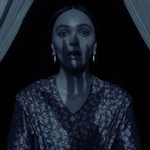 102 years after F.W. Murnau’s illegal copyright violation classic, here’s writer/director Robert Eggers following up THE WITCH, THE LIGHTHOUSE and THE NORTHMAN with THE NOSFERATU.
102 years after F.W. Murnau’s illegal copyright violation classic, here’s writer/director Robert Eggers following up THE WITCH, THE LIGHTHOUSE and THE NORTHMAN with THE NOSFERATU.
Nosferatu? Yesferatu. Absolutelyferatu.
In many ways NOSFERATU is pure Eggers: the meticulous attention to old timey visual, linguistic, and folkloric detail; the dreary natural lighting like you were sent hurtling to the past and forced to deal with a lack of electricity; the emphasis on mood, atmosphere and performance over modern horror tropes. The biggest way it’s different comes from being an adaptation (of an adaptation): while he maintains his trademark of presenting deeply researched superstitions of the past as reality, he has to do it with the more conventional horror set up that only the protagonists believe in the supernatural, and the others around them don’t buy it until it’s too late.
But it works. I would not survive in this world. I would be one of the chumps who insists that plagues are real and dealt with via medicine, not magical curse bullshit. I would hear the guy say “I will not yield to being haunted by some ghost” and I would say “Yeah!” In the real world I would be correct. In NOSFERATU I would be fucked.
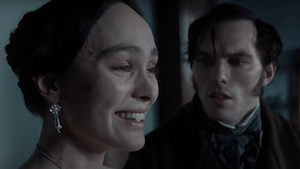 The science guys are wrong about other shit too. This is where the protagonist Ellen Hutter (Lily-Rose Depp, TUSK) overlaps with THE WITCH’s Thomasin: the community she’s been born into is not designed to accommodate women or their problems. As a child (?) in the prologue she cried out for a spirit to love her (a horror story metaphor for burgeoning horniness, I think) and was assaulted by a beastly force that will speak to her, haunt her and cause seizures in her for years to come. Her well-meaning real estate agent husband Thomas Hutter (Nicholas Hoult, RENFIELD), her best friend Anna (Emma Corrin, the bald lady from DEADPOOL & WOLVERINE), Anna’s husband Friedrich (Aaron Taylor-Johnson, SAVAGES) and local hospital doctor Dr. Sievers (Eggers’ regular Ralph Ineson,
The science guys are wrong about other shit too. This is where the protagonist Ellen Hutter (Lily-Rose Depp, TUSK) overlaps with THE WITCH’s Thomasin: the community she’s been born into is not designed to accommodate women or their problems. As a child (?) in the prologue she cried out for a spirit to love her (a horror story metaphor for burgeoning horniness, I think) and was assaulted by a beastly force that will speak to her, haunt her and cause seizures in her for years to come. Her well-meaning real estate agent husband Thomas Hutter (Nicholas Hoult, RENFIELD), her best friend Anna (Emma Corrin, the bald lady from DEADPOOL & WOLVERINE), Anna’s husband Friedrich (Aaron Taylor-Johnson, SAVAGES) and local hospital doctor Dr. Sievers (Eggers’ regular Ralph Ineson, ![]() ) will all hear her tearful monologues about her death dreams or witness her fits, and they will try to help in any way they can other than listening, understanding, or validating.
) will all hear her tearful monologues about her death dreams or witness her fits, and they will try to help in any way they can other than listening, understanding, or validating.
“Never speak such things aloud. Never. It is a trifle, a nothing. A foolish dream. Everything is well,” is how “Thomas tries to soothe her,” according to a 2016 version of the script I found on archive.org. Dr. Sievers sees himself as very modern and progressive, he doesn’t like locking patients up in cells. As she gets worse he recommends wearing a corset in bed (for posture), prescribes more ether (by putting a rag over her mouth), and authorizes tying her to the bed.
She can having loving moments of affection with Thomas, as well as sudden lustful ones, but as soon as he leaves the room (or sometimes before) she might go into a daze and speak quietly to someone who isn’t there. So it’s a problem when his weirdo occult obsessed boss Herr Knock (Simon McBurney, ALLIED) sends him on a trip to the Carpathian Mountains to finalize a sale to the “very old, very eccentric” Count Orlok. Their friends promise to look after her, but they don’t stand a chance.
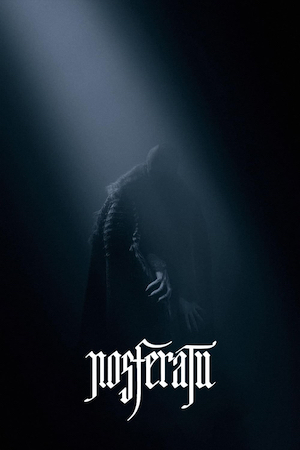 To me the most effective section of the movie, and maybe Eggers’ best directing to date, is Thomas’ whole journey to and visit with Orlok in his castle. It’s a movie about somnambulism, and this stretch in particular has a dazed feeling, like falling in and out of sleep. Eggers and his regular director of photography Jarin Blaschke went for natural lighting, with many scenes lit by candles or torches, and it’s like actually being in the dark and having to squint to make some things out. I know it will feed into the “movies are too dark these days” discussion, but properly calibrated it’s incredibly transporting, and the elliptical storytelling (editor: Louise Ford, DON’T BREATHE) disorients in just the right way. When he’s across the table from Orlok and suddenly Orlok is standing behind his shoulder pouring him a glass of wine it really feels like being drugged, or in a fugue state. Did he teleport, or did I lose some time? What is going on?
To me the most effective section of the movie, and maybe Eggers’ best directing to date, is Thomas’ whole journey to and visit with Orlok in his castle. It’s a movie about somnambulism, and this stretch in particular has a dazed feeling, like falling in and out of sleep. Eggers and his regular director of photography Jarin Blaschke went for natural lighting, with many scenes lit by candles or torches, and it’s like actually being in the dark and having to squint to make some things out. I know it will feed into the “movies are too dark these days” discussion, but properly calibrated it’s incredibly transporting, and the elliptical storytelling (editor: Louise Ford, DON’T BREATHE) disorients in just the right way. When he’s across the table from Orlok and suddenly Orlok is standing behind his shoulder pouring him a glass of wine it really feels like being drugged, or in a fugue state. Did he teleport, or did I lose some time? What is going on?
Bill Skarsgård, younger brother of The Northman and guy who played Pennywise, somehow contorts himself into the nosferatu. Possibly using alchemy. I like that they never released any pictures of him and I really didn’t know what to expect. In the movie you only see a flash of him near the beginning, then some shadows. When we finally arrive at his castle he’s out of focus, then it’s so dark you can barely make him out, then you start going “oh shit, he has a mustache!” He has the pointy nose and spindly fingers of the original Max Schreck version but it’s a whole different vibe. This guy would be more at home chopping wood or shoeing a horse than the original one would. Maybe it’s just the ‘stache, though. It also occurred to me that his huge fur coat makes him look like the self portraits of Edward Gorey, who famously designed a 1977 Broadway production of the Dracula play originally commissioned by Frances Stoker to help retain the film rights after suing over NOSFERATU. I don’t think that’s an accident.
Anyway I don’t know if I’ve seen a Dracula with a mustache before, much less a dong. You see some Dracula dong in this one. History is being made all around us.
NOSFERATU might be a new high for Skarsgård, but let me be the rare one to say he’s had a hell of a year with this following BOY KILLS WORLD and THE CROW. Neither of those was very profitable or popular but I was really impressed by his work in them, both performance and action-choreography wise. And here I see him and hear him and see no trace of it being the same guy. The voice is amazing, the closest comparison I can make is Emperor Palpatine at his freakiest. Deep, heavily accented, rolling Rs, but mixed in with gross breathing and bizarre growls. Icelandic mezzo-soprano Ásgerður Júníusdóttir was his vocal coach, and he does something akin to or inspired by Mongolian throat singing. It’s a weird role.
Depp is great too, a face not familiar to me (not having seen YOGA HOSERS) but filling the giant Imax screen with such ease. Like that poor little brother in THE WITCH you wonder both about her emotions and her spectacular convulsions of possession. They look painful.
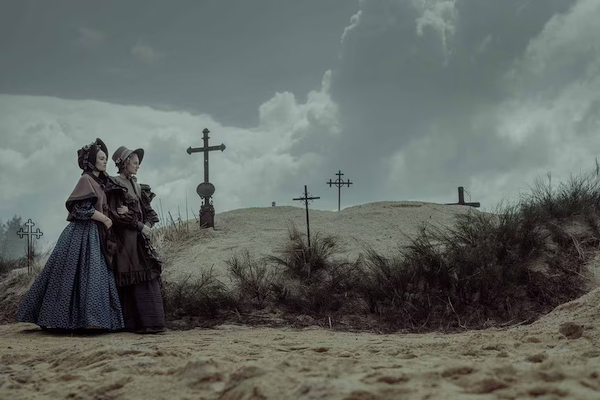
Back home Ellen is not having a good time. Even when they lace up their dresses and put on their big fancy hats for a nice walk along the shore the sky is grey, there are graves all around and she ends up on the ground spasming, much to the annoyance of Friedrich. He’s starting to regret helping out his bro. The only time there’s lots of color in the frame is when his little daughters are there, but they’re usually begging “muh-mah” and “puh-pah” not to leave them alone in the room where a monster could come. (They are correct to worry.)
When Dr. Siever’s ideas for helping Ellen fail he resorts to the craziest hail mary he has left, which is to track down his mentor, Professor Albin Eberhart Von Franz (Willem Dafoe, THE LOVELESS). Thing is, Von Franz was “tossed out of the university, laughed out of his home country” for believing in alchemy and shit. Von Franz is of course the unauthorized Van Helsing, but in Stoker’s book (as well as Francis Ford Coppola’s BRAM STOKER’S DRACULA) I enjoy how much of a psycho Van Helsing is. Von Franz is a weirdo who freaks people out but he’s more empathetic and kind to the patient than the real doctors.
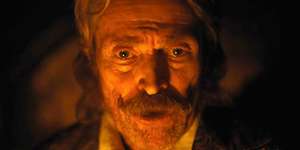 Just like THE LIGHTHOUSE was automatically great cinema just for having Dafoe smoke a corncob pipe, grimace and use old timey sailor lingo, this one is worth it just for his voice croaking out occult shit and his ticker contemplating as he smokes a pipe so long and elegant it would make Sherlock Holmes feel like a fuckin loser if he saw it. And we’ve already heard Ineson’s deep voice introduce his specialty of “Alchemy, mystic philosophy… the occult.” These words and these voices have found their soul mates.
Just like THE LIGHTHOUSE was automatically great cinema just for having Dafoe smoke a corncob pipe, grimace and use old timey sailor lingo, this one is worth it just for his voice croaking out occult shit and his ticker contemplating as he smokes a pipe so long and elegant it would make Sherlock Holmes feel like a fuckin loser if he saw it. And we’ve already heard Ineson’s deep voice introduce his specialty of “Alchemy, mystic philosophy… the occult.” These words and these voices have found their soul mates.
The corset, later cut off to allow Ellen to breathe, is the perfect symbol for the extra pressure put on women in this time, but in general the clothing (costume designer: Linda Muir, EXOTICA) indicates an attempt to tame the untamable. Symbols of class like the carefully detailed bow ties, bonnets, overcoats, mustache curls and elaborate hair braid (which Ellen cuts, I think in deference to a vampire’s fear of knots) are contrasted with pitiless nature (wolves, cold, darkness) and distasteful bodily function (drool, vomit, blood dripping from mouths and eye sockets). Their sexual urges are messy and uncomfortable even by today’s standards. Ellen is at times turned on by the monster/predator/groomer that violated her – a reasonable cause for shame and confusion and a way this century-plus-old chestnut can still be deeply unsettling.
I do think there’s some humor in the movie, like when Dr. Sievers responds to Knock biting the head off of a pigeon by calmly asking “My dear fellow, why would you do that?,” or the timing of Thomas and Von Franz arriving moments after Orlok’s spectacular death sequence. But like all Eggers movies it is powered by a fierce commitment to and belief in the material. If you can’t put yourself into the situation then the spell will have no power over you, but that’s your loss.
I rewatched the 1922 Murnau joint around Halloween. It was the first time that it occurred to me “oh shit, is this some kind of hideous anti-semitic stereotype?” Germans fearing a hook-nosed rat-man coming from a foreign land, bringing disease. Yes, some quick research confirms that this is something many have read into it, although some have provided evidence of Murnau’s relationships with many Jews (including the guy who plays Knock) to argue that he didn’t do it consciously. Anyway, it’s nice that Orlok’s iconic monster design has outlasted the popularity of that particular caricature.
Reinterpreted here I don’t see anything offensive about it, but he is still a feared foreigner. Can’t really get around that. At the same time he represents European nobility – he’s real pissy about making sure you address him as such – a very old monster lording over us from a castle. A despicable asshole who nevertheless has fanatical toadies, and can afford to buy shitty real estate at inflated prices to get what he wants. Like so many rich and powerful people he seems to live an absolutely miserable life only dedicated to tormenting others. I don’t think he has hobbies, or friends. Maybe the wolves like him. But he’s a creepo brought barely to life by the very fact that some young woman far away was lonely once, and now he won’t leave her alone.
His secret occult knowledge gives him power, but then again our guy Von Franz has studied it too and he figures out how to stop him from cursing all of Germany. As Kool Moe Dee said, Knowledge Is King. Doesn’t help Ellen all that much, though. She’s the one who has to make the sacrifice.
When I first reviewed THE WITCH eight years ago I subtitled the review “(and the great horror divide)” and tried to describe a growing schism in horror fandom over the rise of “slow,” “pretentious,” “A24” horror. I came down in favor of it, though I was not personally in love with THE WITCH at that time. Later I did love THE NORTHMAN so much that I started to feel like I finally got Robert Eggers, so I caught up with THE LIGHTHOUSE and returned to THE WITCH and now I think Eggers is one of the greats.
 I bring this up because, the tastes of many of our regulars here not withstanding, it’s pretty clear which side won. The evidence is in the day after Christmas, completely filled 7:15 pm showing I went to at the Boeing Imax. I never had to sit in the third row before! This was a popcorn munching mainstream entertainment crowd filling up the place for what is basically the big budget version of THE WITCH. Yeah, the production values and (sort of) name brand make it more commercial, but its style, tone and themes are very similar to THE WITCH. To my surprise I only heard excitement on the way out, didn’t notice any grumbling. It really seemed to me like it went over well. Never thought I’d see the day.
I bring this up because, the tastes of many of our regulars here not withstanding, it’s pretty clear which side won. The evidence is in the day after Christmas, completely filled 7:15 pm showing I went to at the Boeing Imax. I never had to sit in the third row before! This was a popcorn munching mainstream entertainment crowd filling up the place for what is basically the big budget version of THE WITCH. Yeah, the production values and (sort of) name brand make it more commercial, but its style, tone and themes are very similar to THE WITCH. To my surprise I only heard excitement on the way out, didn’t notice any grumbling. It really seemed to me like it went over well. Never thought I’d see the day.
Overall this seems to be getting a good response, though there are certainly naysayers. Which is allowed. But I want to respond to the many people I’ve seen saying it’s not as good as BRAM STOKER’S DRACULA. Well, first of all, what is even the comparison, that’s Dracula, this is Nosferatu, it’s a totally different character. Second of all, I might agree, that might be better, but they’re two spectacular interpretations of a similar story. Personally I have room in my heart for the Murnau, the Browning, the Coppola, the Eggers. Also the Spanish language version shot on the same sets! And many others. As long as they’re fictional I support a variety of Counts.
Apologies to the estate, but there’s no question in my mind that this can sit proudly alongside the many great cinematic translations and rip-offs of Stoker’s book. I do think it’s the least essential Robert Eggers movie, since it’s the least original. But on a purely cinematic level it’s his most potent and intoxicating so far, and I’m not gonna look that horse in the mouth. In fact I’m not sure there even are any horses, this thing arrived on a phantom carriage, it was very dark, and I was in somewhat of a hypnotic state. I’m sorry, man. If I’m standing at a crossroads in the snow in the woods at night and that thing rolls up, and the door opens on its own, I’m getting in. That’s just how it is. I need to see what happens.
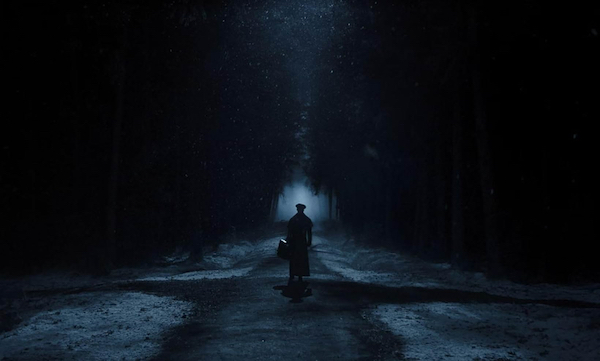
p.s. For the record this takes place around Christmas time. It’s mentioned several times, there’s some good snow, and “O Tanenbaum” plays in one scene. It’s obviously not Christmas-y in a “must watch every Christmas” or “must only watch before Christmas” sort of way, but I’m tagging it as Christmas horror because Ellen’s situation is such a good metaphor for the common seasonal experience of “I can’t stop being depressed and it’s gonna ruin Christmas.”
p.p.s. I like the tagline “Succumb to the darkness” because it reminds me of THE PHANTOM’s “Slam evil” but sort of means the opposite.


























December 31st, 2024 at 7:30 am
Programming note: I don’t think I’ll be able to have a review ready to post tomorrow, but I will return soon!